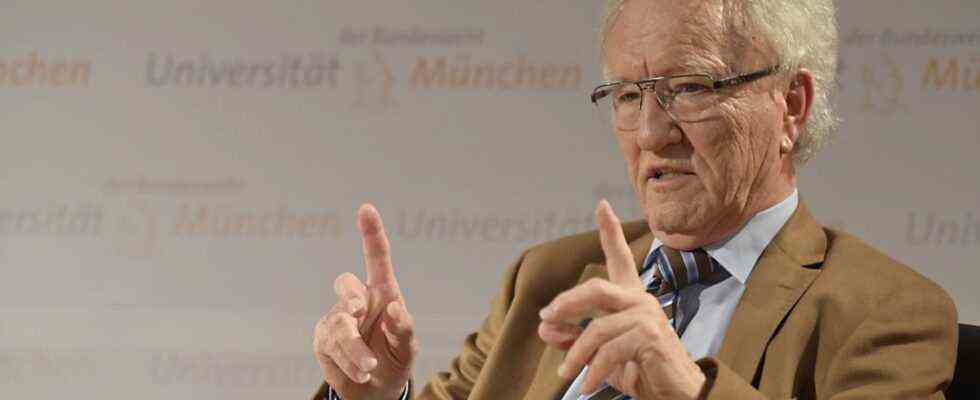From Vancouver to Vladivostok, says Horst Teltschik, everyone could have lived under the same security architecture. It wasn’t long ago, he reports, that the Russian presidents were considering joining NATO. Yeltsin said at the time that it was still too early for that and that he knew personally from Putin that Russia was ready to cooperate on security policy issues.
Teltschik shared groundbreaking experiences like this with his audience on Thursday evening in Neubiberg. The University of the Federal Armed Forces welcomed the political advisor, who helped shape German foreign policy in the late 20th century, for a biographical interview.
Between 1982 and 1990, under Helmut Kohl, Horst Teltschik was the ministerial director in the Federal Chancellery, responsible for foreign and internal German relations, development policy and external security. He is considered the architect of German unity because he was in charge of seminal meetings between Gorbachev and Kohl. Later he was head of the Munich Security Conference. The now 81-year-old was born in 1940 in what is now Kujavy in northern Moravia. His father fought in both world wars. In 1946 he drove the family to flee west. They fled from the Sudetenland to the Tegernsee. For his sixth birthday, little Horst got jam on his bread – it was the only present. “We weren’t exactly welcome in Bavaria. If someone asked who I am, the Bavarian didn’t answer: that’s Horst Teltschik, but: that’s the refugee,” he remembers. And that was in 1960. It was a hard life, so he has great understanding for the problems of the refugees who come to us today.
Teltschik speaks slowly, but clearly and in a structured manner. The sharpness of his mind flashes in each of his carefully considered sentences. The moderator of the evening, Professor Manuela Pietraß, asks him about his “inner railing” and his “security of doing the right thing”. But Teltschik answers the abstract questions with examples from his life. He was present at more than 70 meetings between French President Mitterrand and Chancellor Kohl.
For the University of the Federal Armed Forces, the motto of the evening is “Inner Leadership”. In Koblenz, the group runs the “Inner Leadership Center”: a think tank for leadership culture. From Horst Teltschik, the students should learn how to still be able to act in moments for which there is no magic formula. It’s about “that the students learn from specific biographical situations what it means to take on responsibility,” says Manuela Pietraß.
Neubiberg’s mayor Thomas Pardeller (CSU) has also come to the Audimax. He is pleased that the university is a magnet for outstanding personalities and a figurehead for the community. Including different opinions in dialogue and still fighting for his vision – the mayor would like to incorporate this balancing act of Teltschik into his own work. German-Russian relations are the topic that Teltschik is particularly concerned with. He doesn’t believe in confrontation and sanctions. “We have to work together and live together.”
Teltschik often talks about his military service. When he was a 19-year-old sergeant lecturing on the atrocities of National Socialism, numerous medals from the Second World War were still sitting in front of him on the school desk. Contempt hit him, he reports. Nevertheless: The basics of inner guidance that he received from the federal government would have accompanied him all his life. First analyze, then evaluate and draw conclusions – this learned way of dealing with military situations is just as useful in politics as it is on the battlefield.
After his military service Teltschik went to Berlin, studied politics at the Free University. In 1968 he got a job as assistant to his professor Richard Löwenthal, and in 1970 he moved to the CDU federal office. Teltschik went to Prime Minister Kohl in state politics, bet on the right card and moved into the Chancellery at Kohl’s side.
On the diplomatic stage, it always helped to familiarize oneself with a country’s culture – from Chinese proverbs to anti-colonial struggles for freedom, says Teltschik. If a chat breaks the ice at the beginning, every minute is well invested. By the way, he says, there is great erotic literature in Chinese culture. With a quote from the “Dream of the Red Chamber”, he put a smile on the face of many Chinese diplomats.

